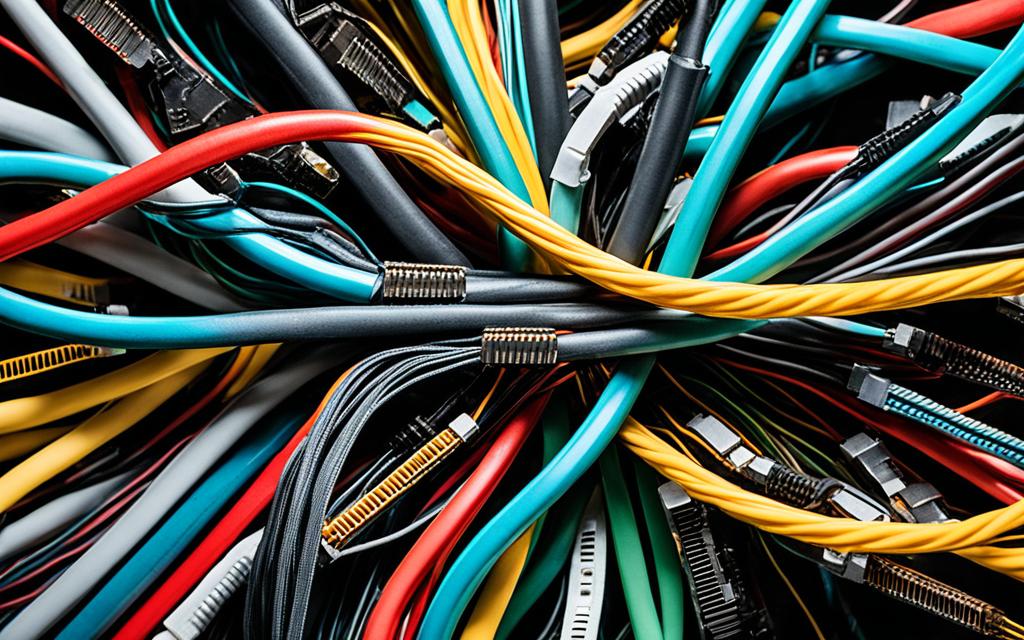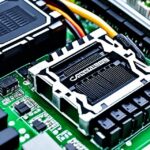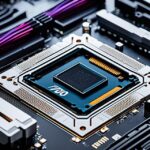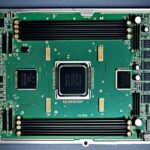Table of Contents
When you decide to build a powerful PC, you might wonder if two CPU power cables are needed for the best performance. It’s very important to know how much power your CPU needs, as there are many types, from the low-power Intel Core i3-13100 to the high-usage Intel Core i9-13900k. The i9, for example, can use up to 253 watts, showing the need for a good power supply.
High-end CPUs can use over 20 amps when working hard. This is why experts suggest using two CPU power connectors on your motherboard. Using two eight-pin connectors can provide up to 672 watts of power. This means your CPU gets consistent power, even when under a heavy load. So, checking if your motherboard has dual CPU power connectors is key for anyone aiming for top performance1.
To wrap up, the need for two CPU power cables depends on your computer’s needs and the type of CPU you use. Making sure your power supply matches your CPU’s needs is important. This prevents problems and helps your computer run at its best.
Key Takeaways
- Modern CPUs often require both a 4-pin and an 8-pin CPU power cable for optimal performance.
- Two eight-pin connectors can deliver up to 672 watts, essential for high-end CPUs under load1.
- The Intel Core i9-13900k can demand significant power, necessitating robust power delivery systems1.
- Compatibility between your motherboard and PSU is vital for proper power delivery.
- Utilising both power connectors enhances reliability and stability during intensive processes.
Understanding CPU Power Requirements
Knowing how much power a CPU needs is key to getting the best out of computers today. Power use changes a lot, depending on things like speed, type of work, and the specific CPU model. For example, powerful CPUs such as the Intel Core i9-13900k might use up to 253 watts when they’re working hard2. An 8-pin connector provides 150 watts of power, but bigger setups might need two to handle the load3.
It’s vital to match the power supply (PSU) with the CPU correctly to boost CPU performance. For most tasks, one connector is enough. But for extreme uses or overclocking, connecting both an 8-pin and a 4-pin may be necessary2. This ensures the power is spread out well, allowing the CPU to work smoothly even when under pressure.
Having both cables connected right keeps the voltage stable. This matters a lot for CPUs with many cores, like those in the EPYC series. Take the EPYC 7313p – it needs 100 to 150 watts for normal tasks. But this can jump to 700 watts for intense activities3. Making sure your PSU can give more power than the CPU needs means your system will run smoothly.
How Power is Delivered to Your CPU
Getting power to your CPU is crucial for it to work well. It starts when the power supply unit (PSU) takes in alternating current (AC) from the wall. This AC is then turned into the direct current (DC) that your computer needs. The way this power reaches the CPU, through different power connectors, is key to its performance.
Power-hungry CPUs need more juice, especially if they have lots of cores or run fast. To cope, some setups use two power cables. This helps spread power evenly, keeping the system stable and preventing drops in voltage that could slow it down4. Systems designed for overclocking, or running the CPU at higher speeds, really benefit from this kind of setup4.
Voltage regulators keep the power steady and safe for the CPU. They adjust the 12 volts from the PSU to what the CPU actually needs. Many motherboards have 8-pin and 4-pin CPU power connectors for this. They make it possible to use two power cables, providing more stability4.
For top performance, you need to think about several things. These include the PSU’s wattage, how it connects, if it fits with your motherboard, and how much power your system uses overall. All these parts must work well together. This ensures your CPU gets the power it needs without any problems45.
Why Does Your Motherboard Have Dual CPU Connectors?
Today’s motherboard design often includes dual CPU connectors. This is to support the high power needs of high-performance CPUs. For example, CPUs like the Intel Core i9-11900K, especially when overclocked or under a lot of work, need more power. An extra connector helps spread out the power use, making sure the system has a steady power supply6.
With dual CPU connectors, motherboards manage heat better. This stops CPUs from overheating, letting them work at their best. The EATX motherboard, for instance, is made for extra connectors. This helps keep things stable during heavy use, showing why this setup is beneficial7.
This design lets the current be divided between connectors, boosting power delivery efficiency. Intel’s engineering guidelines say that motherboards with extra power ports use them as needed. This prevents too much voltage. These steps show how motherboard design is evolving. They meet the needs of modern high-performance CPUs, focusing on system health and life span8.
https://www.youtube.com/watch?v=1cKAcHoBrzY
Do I Need Two CPU Power Cables for Optimal Performance?
Using two CPU power cables can improve your computer’s stability and speed. This is especially true for tasks that demand a lot and for overclocking. With dual connectors, your CPU gets more power. This prevents power fluctuations. Studies show that PCs with two CPU power cables often perform better. They show marked efficiency improvements9.
Benefits of Using Two CPU Power Cables
Two CPU power cables allow for better power spread. This is crucial for modern processors. An 8-pin connector offers up to 336 watts. Two connectors can give up to 672 watts. This meets the needs of even the most demanding CPUs1. For example, Intel’s Core i9-13900k can use up to 253 watts1. Also, mixing an 8-pin with a 4-pin helps manage different loads. This boosts reliability and helps stop overheating10.
Considerations for Your Hardware Compatibility
Check if your hardware can use two CPU power cables. Most recent CPUs need an 8-pin EPS and a 4-pin ATX12V connector10. Not all motherboards need both, but using both is smart for better performance and longer life10. Make sure your PSU can handle this. High-performance CPUs might need over 20 amps. This requires a split current for ongoing operation1. Look at your motherboard and CPU manuals for the best setup advice.
| Power Configuration | Power Delivery (Watts) | Recommended Use |
|---|---|---|
| Single 8-Pin Connector | 336 | Basic Tasks |
| Two 8-Pin Connectors | 672 | High-Performance Tasks |
| 8-Pin + 4-Pin Configuration | 504 | Stable Overclocking |
Power Connector Types: 4-Pin vs. 8-Pin
Knowing the difference between 4-pin and 8-pin connectors can majorly boost your CPU’s power. The 4-pin connector brings up to 192 watts to the table, fitting for simple setups. On the flip side, the 8-pin connector doubles the juice to 384 watts11, outshining the 4-pin in powering up your system.
Comparative Power Delivery Capabilities
The 8-pin CPU power connector plays a big part in today’s computers. Each one can handle 150 watts, adding up to 300 watts as per ATX guidelines. This is crucial for demanding processors like the EPYC 7313p, which use 100-150W3. The leap in power from the 4-pin to the 8-pin means better performance and system stability12.
Choosing the Right Connector for Your Setup
Picking the right connector hinges on what your CPU and motherboard can take. If they’re 8-pin ready, that’s the way to go for top-notch performance. This choice helps avoid common issues seen with the basic 4-pin connectors11.
Also, smartly managing cables by tucking them behind the motherboard tray keeps airflow smooth and your setup tidy. This is key for your system’s lasting power and efficiency3.
| Connector Type | Power Delivery (Watts) | Typ inal Usage |
|---|---|---|
| 4-Pin Connector | 192 Watts | Basic CPUs, Entry-level Systems |
| 8-Pin Connector | 384 Watts | High-performance CPUs, Advanced Gaming, and Server Systems |
Conclusion
The discussion about dual CPU power cables shows their key role in improving CPU performance, especially for powerful systems. They are not needed for every setup. But, for systems that are overclocked or have multiple CPU sockets, using two cables helps a lot1314.
This approach helps avoid problems like voltage drops and overheating. It creates a stable and reliable condition for tough computing tasks1314.
Also, the type of power supply is very important. Modern PSUs support modular designs. This lets users match their connections to their hardware needs15. Knowing these details can help keep your system running smoothly, even with demanding applications.
Choosing to use dual CPU power cables is an important decision for anyone wanting the best from their system. This choice greatly influences the stability and performance of your setup. It leads to a stronger and safer system under heavy use1314.
FAQ
Do I really need two CPU power cables for my system?
Not every setup needs two CPU power cables. But, high-performance CPUs doing tough tasks do benefit. They get better power and stability.
How do I know if my power supply unit (PSU) can support dual CPU connectors?
Look at your PSU’s details to see if it’s strong enough and has the needed connectors. If your CPU needs a lot of power, two connectors help keep things stable.
What are the differences between 4-pin and 8-pin CPU power connectors?
An 8-pin connector can send more power (up to 384 watts) than a 4-pin (up to 192 watts). Choosing the right connector for your CPU makes sure it works well.
What role do Voltage Regulator Modules play in CPU power delivery?
Voltage Regulator Modules (VRMs) are crucial. They change 12 volts into a stable voltage your CPU can use. This ensures your CPU gets power efficiently when it’s under a lot of stress.
Can using two CPU power cables prevent overheating?
Yes, using two cables helps with heat. It lets power spread out, lowering the risk of getting too hot when the load is heavy. This helps in managing the heat better.
How do I choose the right power connectors for my build?
Make sure your power connectors fit your CPU and motherboard. Check their compatibility and power needs. This ensures your system can handle what you throw at it.
Source Links
- https://www.makeuseof.com/why-your-motherboard-has-cpu-power-1-cpu-power-2/ – Why Your Motherboard Has CPU Power 1 and CPU Power 2
- https://www.techpowerup.com/forums/threads/quick-q-do-i-need-to-connect-1-or-both-cpu-cables-from-my-rm850x-to-my-z690-gaming-x-motherboard.297542/ – Quick Q: Do i need to connect 1 or both cpu cables from my RM850x to my Z690 Gaming X motherboard?
- https://forum.level1techs.com/t/why-are-there-two-8-pin-cpu-connectors-on-my-board/204234 – Why are there two 8-pin CPU connectors on my board?
- https://softwareg.com.au/blogs/computer-hardware/does-my-cpu-need-2-power-cables – Does My CPU Need 2 Power Cables
- https://link.springer.com/chapter/10.1007/978-1-4302-6638-9_2 – CPU Power Management
- https://www.makeuseof.com/power-connectors-motherboard-cpu-require/ – What Power Connectors Do a Motherboard and a CPU Require?
- https://www.overclockersclub.com/guides/atx_psu_startup/ – How To Turn On An ATX Power Supply Without A Motherboard
- https://www.gigabyte.com/Motherboard/B650-AORUS-ELITE-AX-rev-10-11 – B650 AORUS ELITE AX (rev. 1.0/1.1) Key Features | Motherboard – GIGABYTE Global
- https://rog-forum.asus.com/t5/amd-500-400-series/should-i-connect-the-second-4-pin-cpu/td-p/911700 – Should I connect the second 4 pin CPU
- https://softwareg.com.au/blogs/computer-hardware/do-i-need-both-cpu-power-connectors – Do I Need Both CPU Power Connectors
- https://www.linkedin.com/advice/0/how-do-you-manage-cable-management – How do you manage the cable management and airflow of a 4-pin or an 8-pin CPU power connector?
- https://rog-forum.asus.com/t5/hardware-build-advice/power-connector-to-the-motherboard-new-build-question-need-help/td-p/875328 – Power connector to the motherboard new build question (need help)
- https://www.techyleader.com/do-i-need-two-cpu-power-cables/ – Do I Need Two CPU Power Cables?-Complete Guide
- https://www.techyelf.com/do-i-need-two-cpu-power-cables/ – Do I Need Two CPU Power Cables?-A Complete Guide
- https://www.cablematters.com/Blog/Computer-Accessories/pc-build-cables – Cables You’ll Need for a PC Build | Cable Matters Blog












